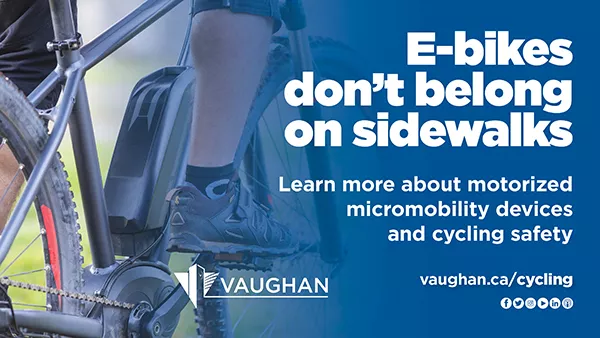E-bikes don’t belong on sidewalks
Learn more about motorized micromobility devices and cycling safety
As warmer weather arrives, more and more people are walking on trails, riding on bike paths or scooting around the community. The City of Vaughan reminds all riders to be a good neighbour – specifically, to not ride scooter-style e-bikes and other motorized micromobility devices on sidewalks, paths and trails. Exemptions apply to motorized wheelchairs and medical e-devices.
As warmer weather arrives, more and more people are walking on trails, riding on bike paths or scooting around the community. The City of Vaughan reminds all riders to be a good neighbour – specifically, to not ride scooter-style e-bikes and other motorized micromobility devices on sidewalks, paths and trails. Exemptions apply to motorized wheelchairs and medical e-devices.
Micromobility is a general term used to describe lightweight human or electric-powered modes of transportation typically used for shorter trips. These include rollerblades, skateboards, bicycles, e-scooters and limited-speed motorcycles or mopeds.
To keep all pedestrians and cyclists safe, micromobility devices that are motorized – such as e-scooters, e-bikes, Segways, electric skateboards and hoverboards – should not be used on sidewalks, cycle tracks, shared pedestrian and bike paths or recreational trails in the city. This does not pertain to people operating motorized mobility/medical scooters or wheelchairs. People operating these devices are treated in the same way as pedestrians on-foot and are permitted on sidewalks, paths and trails.
E-bikes can be used on most roads and highways where conventional bikes are permitted, with some exceptions. E-bikes are not allowed on certain provincially controlled-access highways, such as the 400 series and City sidewalks, paths, trails and lanes.
Micromobility lity is an emerging trend. City staff are examining additional measures to ensure the safe use of these devices. Public feedback will be sought on this topic. Sign up to join the project’s mailing list and stay informed about opportunities to provide input.
CYCLING SAFETY TIPS AND ETIQUETTE
A bicycle is considered a vehicle under the Ontario Highway Traffic Act (HTA). This means cyclists have the same rights and responsibilities to obey all traffic laws as other road users. A cyclist who violates a traffic law can be stopped by a police officer, which may result in a fine under the HTA. Ontario law requires cyclists to have the following on their bike:
- white reflective tape on the front forks
- red reflective tape on the rear forks
- a white front light
- a red rear light or reflector
- a working bell or horn
Cyclists are also required to wear a helmet if under the age of 18 – it’s the law. However, it is recommended for riders at any age to wear a helmet.
When sharing space with pedestrians, cyclists must:
- keep to the right.
- pass on the left when safe to do so.
- yield to pedestrians.
- let pedestrians know they are approaching with a friendly greeting or by ringing a bell or horn.
When riding on the road, cyclists must:
- travel in the same direction as motorists.
- obey traffic lights and stop signs.
- use hand signals to communicate their intentions with motorists and pedestrians.
VAUGHAN’S CYCLING AND MULTI-USE RECREATIONAL TRAILS NETWORK
Expanding existing active transportation networks and offering comfortable options for biking and walking contributes to a healthier environment and helps alleviate traffic congestion. These active transportation networks also bring the community together, establish transit connections and get more people moving. The current cycling and multi-use recreational trails network in Vaughan is growing and consists of the following main types of cycling facilities:
- Cycle tracks: designated space for cyclists that are separate from pedestrians and motorists. These areas are marked with a bicycle symbol and diamond on the road.
- Bike lanes: designated space for cyclists that are separate from pedestrians but run along the same road as motorists. These areas are made visible with payment markings.
- Multi-use pathways: shared space for pedestrians and cyclists that are separate from motorists. These areas are within the boulevard along a roadway.
- Multi-use recreational trails: shared space for pedestrians and cyclists found within parks and open spaces.
With a growing network of sidewalks, cycle tracks, bike lanes, multi-use paths and recreational trails, the City of Vaughan is proactively taking steps towards advancing active transportation in the community. With initiatives such as the 2020 Pedestrian and Bicycle Master Plan Update, the Vaughan Super Trail, the Clark Avenue bike paths, the Vaughan Metropolitan Centre (VMC) Cycling Network Plan and much more, the City continues to expand its transportation network to further promote a full range of options to get around, including walking, cycling and transit. A comprehensive update on all of these projects is outlined in Vaughan’s Active Transportation Annual Report, which was recently presented to Council.
-30-

